quies-, -quiet-, -quit-
(Latin: rest, calm, silent)
acquiesce (verb), acquiesces; acquiesced; acquiescing
1. To consent, to agree to do something, or to comply passively without protest: Sam acquiesced to his wife's request that he put the laundry into the washing machine.
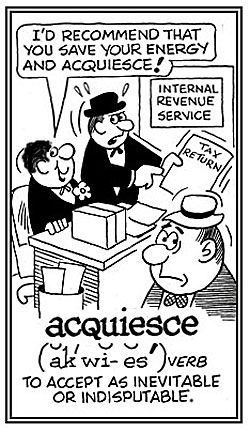
© ALL rights are reserved.
Go to this Word A Day Revisited Index
Celeste is acquiescing to the pleading of her child for another piece of cake.
2. Etymology: derived from the Latin verb quiescere, "to be quiet". It came into English in about 1620, via the French acquiescer with the outdated meaning of "to rest satisfied".
Go to this Word A Day Revisited Index
for a list of additional Mickey Bach illustrations.
An agreement to go along with what another person suggests either by being quiet and not saying anything or without arguing about it: The men demanded that Bruce pay them for his protection and so he decided to give them his acquiescence.
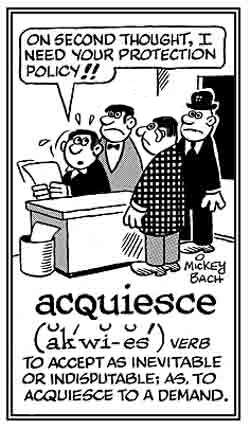
© ALL rights are reserved.
Go to this Word A Day Revisited Index

Go to this Word A Day Revisited Index
for a list of additional Mickey Bach illustrations.
acquiescent (adjective), more acquiescent, most acquiescent
1. Willing to accept or to agree to doing something without an objection, a protest, or any resistance: Acquiescent people are sometimes thought of as quiet and mousy because they tend to do whatever they are asked to do without any protest.
2. Etymology: from Latin acquiescere, "to remain at rest" or "to become quiet".
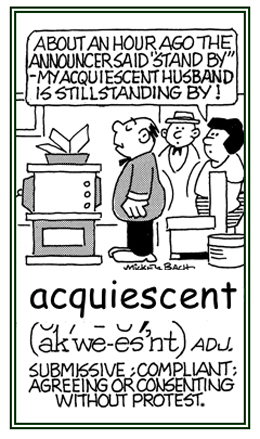
© ALL rights are reserved.
Go to this Word A Day Revisited Index
2. Etymology: from Latin acquiescere, "to remain at rest" or "to become quiet".

Go to this Word A Day Revisited Index
so you can see more of Mickey Bach's cartoons.
acquiescently (adverb), more acquiescently, most acquiescently
acquit (verb), acquits; acquitted; acquitting
1. To find or to declare someone innocent or not guilty: The jury acquitted Jerome of the charges of driving while intoxicated since he was simply driving too slowly on the express way and had never drunk anything alcoholic.
2. Etymology: ultimately related to quiet from the Latin noun quies; from which the word quiet resulted and it is considered to be the basis of the verb quietare, then quitare, "put to rest" which developed into "settle"; as in "to settle a debt".
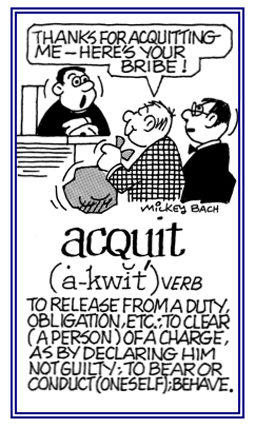
© ALL rights are reserved.
Go to this Word A Day Revisited Index
2. Etymology: ultimately related to quiet from the Latin noun quies; from which the word quiet resulted and it is considered to be the basis of the verb quietare, then quitare, "put to rest" which developed into "settle"; as in "to settle a debt".
With the addition of the prefix ad-, this term evolved into Old French as a(c)quiter, and then into English with the meaning "settling or discharging debts".
The current meaning of "declare not guilty" didn't appear until the 14th century, and the most recent meaning, "conduct oneself in a particular way" resulted from the idea of discharging one's duties.

Go to this Word A Day Revisited Index
so you can see more of Mickey Bach's cartoons.
1. A judgement or decision, as by a judge or by a jury, that a defendant is not guilty of a crime as charged and is free to go: The trial resulted in an acquittal of Bryan because he was not even in the neighborhood when and where the woman was robbed.
2. Etymology: from Latin ad, "to" + quitare, "to set free, to clear".
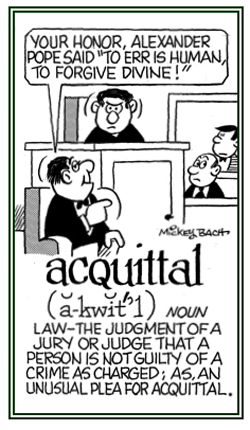
© ALL rights are reserved.
Go to this Word A Day Revisited Index
2. Etymology: from Latin ad, "to" + quitare, "to set free, to clear".

Go to this Word A Day Revisited Index
so you can see more of Mickey Bach's cartoons.
acquittance
coy (adjective), coyer, coyest
1. Artfully or affectedly shy or reserved; slyly hesitant; coquettish.
2. Shy, modest, or reserved in social situations.
3. Showing reluctance; especially, when insincere or affected, to reveal one's plans or opinions, to make a commitment, or to take a stand.
4. Etymology: from Old French coi; earlier quei, "quiet, still"; ultimately from Latin quietus, "resting, at rest".
2. Shy, modest, or reserved in social situations.
3. Showing reluctance; especially, when insincere or affected, to reveal one's plans or opinions, to make a commitment, or to take a stand.
4. Etymology: from Old French coi; earlier quei, "quiet, still"; ultimately from Latin quietus, "resting, at rest".
coyish (adjective), more coyish, most coyish
coyly (adverb), more coyly, most coyly
1. Pertaining to having a shy or sweetly innocent quality that is often intended to be attractive or to get attention: "When Bill sat next to a young woman on the bus, she smiled coyly."
2. Conveying a reluctance to reveal information: "When Bill started to talk to the woman, she coyly refused to respond to his questions."
2. Conveying a reluctance to reveal information: "When Bill started to talk to the woman, she coyly refused to respond to his questions."
disquiet
disquieting (adjective), more disquieting, most disquieting
A reference to being very worried or nervous about something: There was a great deal of disquieting news about the sinking of the ferry with so many children for the families who heard about it.
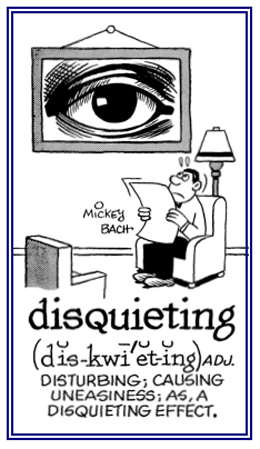
© ALL rights are reserved.
Go to this Word A Day Revisited Index
The world has been very upset by the disquieting reports about the kidnapping of so many girls from the boarding school in Nigeria.

Go to this Word A Day Revisited Index
so you can see more of Mickey Bach's cartoons.
disquietingly
disquietly
Cross references directly, or indirectly, involving "calm, calmness, peace, quiet": pac-, peac-; plac-; seren-.

